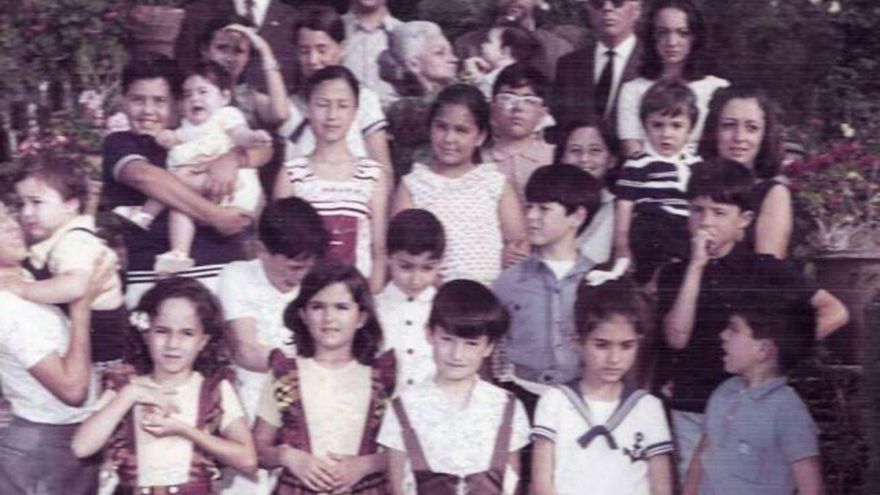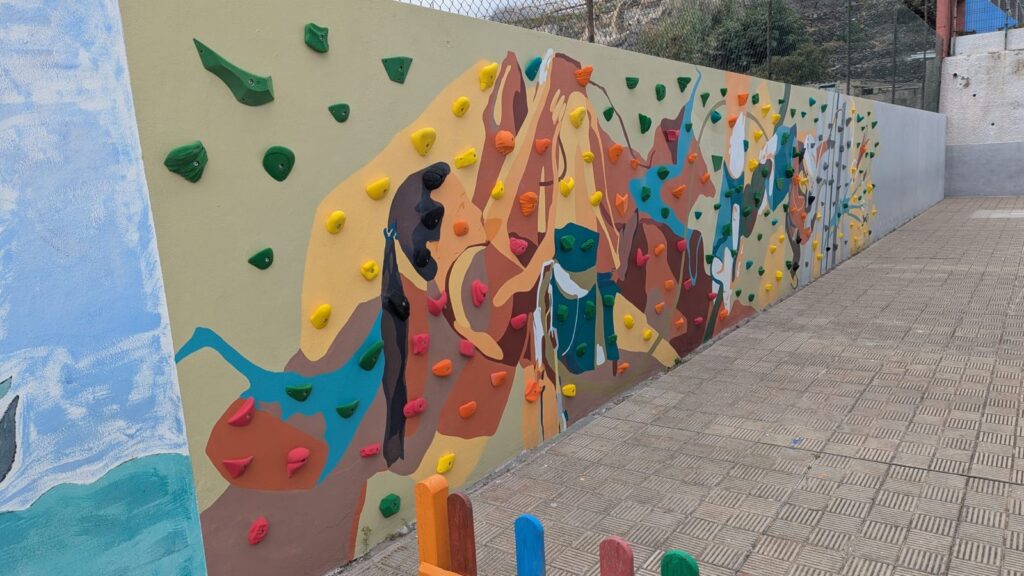
Many educational institutions, sports arenas, squares, and streets in our localities bear the names of individuals connected to those places, often without most people passing through ever knowing or questioning the person behind the name on the sign. This report initially aimed to shed light on a remarkable figure in our family after whom a secondary school in La Orotava was aptly named.
IES La Orotava Manuel Gonzalez Pérez is inscribed on the entrance through which over a thousand students pass every morning, possibly unaware of the man behind the name adorning the institution. Following an extensive interview with the school’s director, Nieves Rodríguez, I believe it is pertinent and imperative to also acquaint you with the activities of this institution, which I dare say is unparalleled in the northern region of the island due to its comprehensive educational offerings. Undoubtedly, my grandfather would be immensely proud of the young minds being nurtured there as they prepare to navigate an increasingly challenging job market.
Manuel González Pérez’s life was far from easy. Another of his grandchildren, the historian Manuel Hernández González, in a recent publication, provides insight into the last republican mayor of the Villa de La Orotava: “He undertook this role in 1931 and during his tenure, he spearheaded the construction of a Hydroelectric Power Plant, which significantly boosted the municipality’s energy capacity, in addition to establishing the first aid center and making significant progress on the road from La Orotava to Vilaflor through the Las Cañadas del National Park Teide.
In February 1936, he once again emerged victorious in the municipal elections as part of the Popular Front coalition within the Republican Left. One of the proposals put forward was the promotion of education at all levels, leading to the establishment of a secondary education institute for the town on the eve of July 18. Indeed, the last town hall square carpet during the Republican era commemorated this historic achievement for the town.
The Ordeal of Francoism
The triumph of the Franco regime resulted in a void in education that would not be addressed until 30 years later. In 1968, Jesús Hernández Perera, a native of Orotava and the rector of the University of La Laguna, finally secured a branch of the women’s university in La Laguna for the town. Four years later, it became independent, overcoming significant hurdles for its establishment, despite smaller towns already holding this status long before. Paradoxically, the COU (University Orientation Course) was phased out in 1975, the year of General Franco’s death.
On June 4, 1936, Manuel González traveled to Madrid with a delegation of farmers led by Luis Benítez de Lugo to secure freight reductions and other concessions from the government to mitigate the impact of the banana sector’s severe crisis caused by the Great Depression. Strengthening ties with the mainland market seemed a promising avenue to offset substantial losses, and their requests were eventually granted. However, it was at this juncture that Madrid was caught off guard by the July 18 coup d’état, which marked the beginning of the Civil War.
For Manuel González, the three years of the Civil War were spent actively supporting the Republican cause, operating both at the Madrid front and in coastal regions, even attempting interventions in North Africa to incite rebellion against Franco’s forces among the Moroccan tribes. In 1939, he went into exile from Barcelona. The end of the fratricidal conflict coincided with the onset of World War II, leading to his incarceration in concentration camps in Argeles, San Ciprian, Barcares, and even on the Atlantic Wall in Normandy, where he was coerced into forced labor by the Nazis.
Evading capture, he actively participated from Vierson in the resistance against Hitler’s army, eventually being appointed head of the Spanish resistance in central France. His companions included friends from the valley, such as Agustín Baeza, Monguillón, and Juan García. Following the war, he continued to reside in the French town until 1948, when he was able to return to his homeland with the support of Lorenzo Machado and fellow student from Barcelona, the Palmeiro Blas Pérez González, a member of Franco’s government. His wife, Rosa, and their eight children had remained in La Orotava. Manuel González Pérez passed away in the Villa on September 20, 1975, two months prior to Franco’s death.
An Exemplary Institution
The institution named after him is a point of reference in this region of the Island, both for the large number of families of Professional Training it provides, totaling five, including secondary education and baccalaureate in Humanities and Social Sciences, as well as Science.
It employs a total of 42 high school and secondary teachers, catering to 219 students in eleven ESO groups, and seventy-four high school students distributed across five groups. Additionally, it has 82 vocational training instructors who teach a further 990 students in 49 groups of basic, intermediate, and advanced degree training cycles in Administration and Management, Wood, Furniture and Cork, Health, Sociocultural and Community Services, as well as Transportation and Vehicle Maintenance, offering both face-to-face and blended learning. The latter, highly sought after by students of all ages, constitutes the most extensive offering in the northern region in the field of early childhood education, nursing, and care for people in dependency situations.
The constant influx of unaccompanied immigrant minors and their integration into classrooms has presented a significant challenge for various educational institutions. At IES La Orotava, the director states, “This process represents a firm commitment to implementing exceptional measures, such as language support, which aids in minimizing a significant barrier for the 19 immigrants we accommodate, considering other aspects such as cultural and social differences, and lack of habits, which require personalized attention for each case.” “Despite these difficulties, their integration has been very positive, and their behavior exemplary. They are highly motivated to earn a qualification that would provide them with job opportunities. Worth noting is their participation in basic automotive degree teaching, where out of the twelve students, nine are immigrants who, with the effort and strategies developed by their teachers, are making progress in both Spanish language acquisition and the acquisition of specific knowledge,” explains Nieves Rodríguez.
“Addressing the needs and profiles of the current labor market is one of the objectives of another initiative at the institution, known as the Applied Technology Classroom (ATECA), which introduces digitalization and the use of information technologies to FP students, in line with the current digital transformation.” “It is a versatile space with high connectivity similar to work environments by incorporating resources from each sector through simulators and other technological elements,” highlights Nieves Rodríguez, who also emphasizes the crucial role this space will play in upcoming courses as a precursor of active methodologies, allowing students access to cutting-edge technological resources that the institution did not previously have.
IES La Orotava is also part of the Canarian Network of Educational Centers for Innovation and Quality of Sustainable Learning (Canarian Network-InnovAS), which promotes improvements in learning processes through innovative and creative approaches in line with the seventeen Sustainable Development Goals (SDGs) of the 2030 Agenda for Sustainable Development. Additionally, they have held the ISO 9001:2015 Quality Certification since the 2007/2008 academic year, enabling them to progress in continuous improvement as a management model for the institution’s various processes.
Addressing diversity is another key focus of the institution, providing an educational response tailored to special educational needs on an individualized basis. Furthermore, promoting parity both through complementary activities and in curricular aspects via coeducation is essential beyond the classroom. Therefore, efforts are also made to detect and intervene in gender violence within the family environment, not only among students.
The center has been running a program called “Living Adolescence as a Family” for several years to facilitate a positive relationship that has a significantly more positive impact on both family and school environments.
The “Re-Creamos” initiative aims to energize breaks as meeting spaces with sports and creative recreational activities. This enhances the school climate through promoting respect, tolerance, peaceful conflict resolution, cooperation, and fostering socialization among students, teachers, and non-teaching staff. Furthermore, linguistic and oral skills are honed through various initiatives such as Radio Kiosk, the Reading Plan, Oral Conferences, and Science and Technology Week. The Reading Plan for this term is entitled “Project Goal,” serving as an effective tool to enhance both reading and current affairs knowledge.
Education for Adults
Lastly, the Institute provides a 30-hour adult training course in basic digital skills that is highly beneficial for acquiring useful concepts related to financial procedures, electronic signatures, webmail, and other topics.
I cannot conclude this report without mentioning an important plea from the director, which remains an outstanding request related to the funding by the Department of Education of the Government of the Canary Islands for the construction of a covered pavilion in a space already designated for it. Several administrations and faculty have repeatedly and unsuccessfully urged the implementation of this action.














